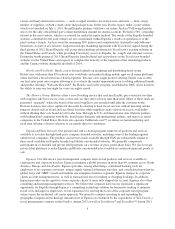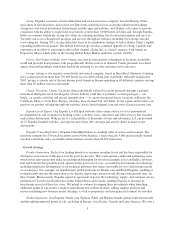Expedia 2013 Annual Report Download - page 20
Download and view the complete annual report
Please find page 20 of the 2013 Expedia annual report below. You can navigate through the pages in the report by either clicking on the pages listed below, or by using the keyword search tool below to find specific information within the annual report.in several European countries, the recent shutdown of the U.S. government, worry over extending the debt
ceiling in the United States and concern about the impact of the pullback in the U.S. Federal Reserve’s
quantitative easing program, are all examples of events that contribute to a somewhat uncertain economic
environment, which could have a negative impact on the travel industry in the future.
Our business is also sensitive to fluctuations in hotel supply, occupancy and average daily rates (“ADRs”),
decreases in airline capacity, periodically rising airline ticket prices, or the imposition of taxes or surcharges by
regulatory authorities, all of which we have recently experienced. For example, the significant decline in ADRs,
which began in late 2008 and continued through 2009, negatively impacted our hotel booking revenue. In
addition, ADRs on our websites in both 2008 and 2009 declined faster than in the overall travel industry due to a
number of factors including the increased use of our distribution channels for promotional activities by hotels.
To the extent ADRs decline in the future, our hotel booking revenue may be negatively impacted.
Other factors that could negatively affect our business include:
• Air fare increases, including increases driven by higher oil prices;
• Continued air carrier consolidation;
• Reduced access to discount airfares;
• Travel-related strikes or labor unrest, bankruptcies or liquidations;
• Incidents of actual or threatened terrorism;
• Periods of political instability or geopolitical conflict in which travelers become concerned about safety
issues;
• Natural disasters or events such as severe weather conditions, volcanic eruptions, hurricanes or
earthquakes;
• Travel-related accidents or the grounding of aircraft due to safety concerns; and
• Health-related risks, such as the H1N1, SARs and avian flu outbreaks.
Such concerns could result in a protracted decrease in demand for our travel services. This decrease in
demand, depending on its scope and duration, together with any future issues affecting travel safety, could
significantly and adversely affect our business, working capital and financial performance over the short and
long-term. In addition, the disruption of the existing travel plans of a significant number of travelers upon the
occurrence of certain events, such as severe weather conditions, actual or threatened terrorist activity or war,
could result in the incurrence of significant additional costs and decrease our revenues leading to constrained
liquidity if we, as we have done historically in the case of severe weather conditions, provide relief to affected
travelers by refunding the price or fees associated with airline tickets, hotel reservations and other travel products
and services.
Our business depends on our relationships with travel suppliers and travel distribution partners.
An important component of our business success depends on our ability to maintain and expand
relationships with travel suppliers and GDS partners. A substantial portion of our revenue is derived from
compensation negotiated with travel suppliers, in particular hotel suppliers, and GDS partners for bookings made
through our websites. Each year we typically negotiate or renegotiate numerous long-term airline and hotel
contracts. No assurances can be given that travel suppliers or GDS partners will not further reduce or eliminate
compensation, attempt to implement multiple costly direct connections, charge travel agencies for or otherwise
restrict access to content, credit card fees or other services, further reduce their ADRs or decide not to make their
travel inventory available to us, any of which could reduce our revenue and margins thereby adversely affecting
our business and financial performance. For example, a number of airlines now charge for checked baggage,
food, beverages and other services. GDSs currently have limited technology to incorporate these elements into
14
























